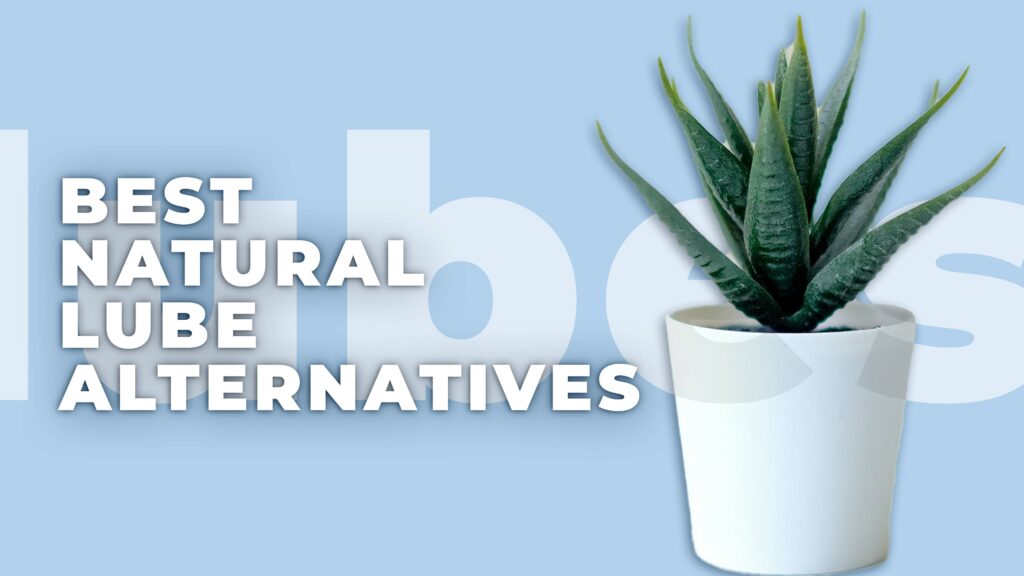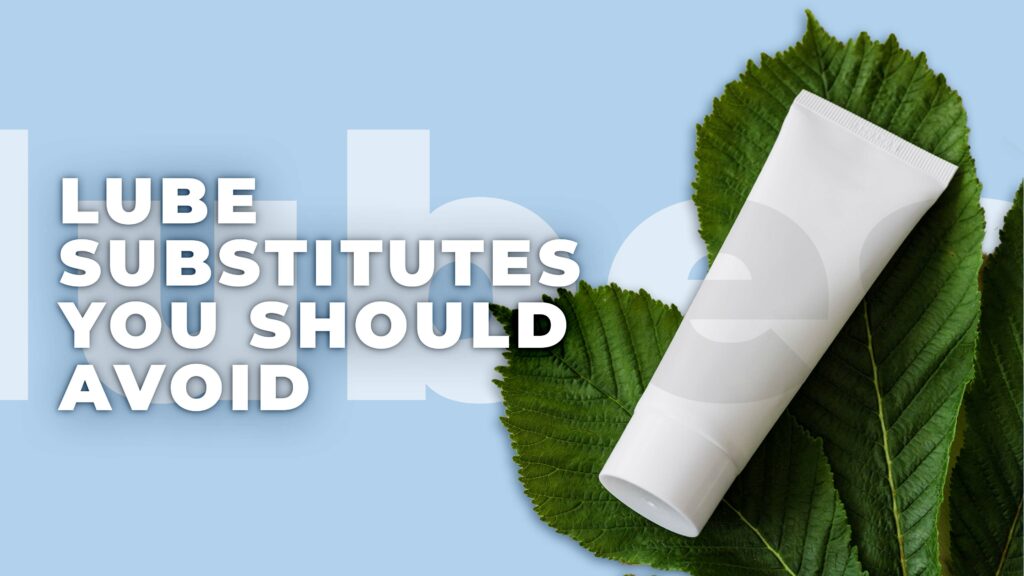When it comes to matters of intimacy, finding the perfect balance of comfort and pleasure is the name of the game. While traditional lubricants have long been a go-to, there’s a whole world of alternatives out there that are capturing attention for all the right reasons.
Not having lubrication can make sexual activity more difficult, but it does not have to stop you. If you don’t have lube, try using alternatives from your kitchen or bathroom cabinets. This article examines different types of lubricants, alternative options that are safe to use, and which varieties to avoid.
Contents
Types of lubricants

Different types of lubricants are available for various sexual activities such as intercourse, masturbation, etc. These include:
Water-based lubricants
These are a great option for those looking for a versatile lubricant. They do not harm condoms or sex toys and are considered safe for use during intercourse and masturbation. However, one downside is that they can dry out quickly, but it can be easily reapplied when needed.
Silicone-based lubricants
These lubricants are a good option for intercourse as they do not harm latex-based contraceptives such as condoms. However, they should not be used with silicone-based sex toys as they may cause damage.
Oil-based lubricants
You can use oil-based lubricants during sex if you’re not using barrier methods of contraception. However, they can damage sex toys and latex condoms, increasing the risk of pregnancy and infection.
Things to Keep in Mind When Choosing Lube Alternatives
When using alternative lubricants, you need to to consider the following:
Safety: Not all liquids or gels found in your home can be used as a lubricant alternative. Some can cause discomfort, irritation, or even pain. Thus, carefully consider your options before choosing a lubricant alternative. It’s important to consider the well-being of both partners.
Ease of Use: When using a lubricant or an alternative, choose something easy and hassle-free to use. It should not be something that requires a lot of effort and time. This will help preserve the mood and prevent frustration. It should be something that can be applied quickly and easily, especially if you are trying it for the first time.
Impact on Condoms: When using lubricants, keep in mind that certain types can degrade the effectiveness of condoms. The same applies to alternative lubricants, as the base ingredients can also have a negative impact. To avoid this, choose safe options that are available on the market. These options may need extra effort, but they are not complicated.
Best Natural Lube Alternatives

Choosing the right natural lubricant can be a bit tricky. Yet, a lot of folks opt for natural alternatives to avoid using unnecessary stuff.
These natural options can include things you probably have at home, like yogurt and oils. Here is a list of some popular alternatives for lube:
1. Aloe Vera Gel
Aloe vera gel can be used as a lubricant alternative because it soothes skin irritation and adds hydration. As it is water-based, it is safe to use with condoms. It can help hydrate skin and reduce irritation, making it a suitable option for use during sexual activity.
When using aloe vera as a lubricant alternative, consider the consistency of the product. Also, make sure it does not contain any other ingredients that may cause irritation. Overall, experimenting with aloe vera as a lubricant option is a safe choice for those looking for a natural alternative.
2. Virgin Coconut Oil
Coconut oil, specifically virgin coconut oil, can be used as a lubricant alternative. It has anti-inflammatory and moisturizing properties. It is a good lube alternative as it turns into a slippery liquid when heated on the skin due to its high saturated fat content. Its natural smell and taste may appeal to some people.
Use food-grade coconut oil, free from additives or preservatives. Coconut oil is versatile and can be used for other purposes, such as skin moisturizers or hair masks. However, it should not be used with latex-based forms of contraception as it can cause damage.
If you’re considering using virgin coconut oil as a lubricant, keep in mind that it’s oil-based. Thus it is not compatible with latex condoms or toys. Additionally, ensure that neither you nor your partner is allergic to coconut-based products to avoid any negative reactions during sexual activity.
3. Plain Yoghurt
Using plain yogurt as a lubricant alternative has not been extensively studied. However, it provides a consistent texture and keeps the area moisturized. Additionally, it is a cost-effective option. Though there is no scientific research, yogurt has been known to have therapeutic benefits for treating vaginal yeast infections.
Plain yogurt can be a good alternative lubricant, as it is relatively cheap, does not dry out, and has a suitable consistency. Additionally, it contains protein, vitamin D, calcium, and probiotics that help with good bacteria growth. However, ensuring that the yogurt does not contain sugar is important. It can cause yeast infections and discomfort during and after sex.
4. Olive Oil
Olive oil, being an oil-based lubricant, is thicker and may last longer than other types of lubricants. However, it is not suitable to be used with latex condoms as it may cause the latex to break down and put you at risk of contracting STIs or becoming pregnant. Olive oil should only be used with synthetic condoms such as polyurethane condoms.
Additionally, olive oil can clog pores and cause irritation, leading to infections. It can also trap bacteria in the vagina or anus. It’s best to do a patch test before using it to make sure you’re not allergic to it. Also, if you are prone to yeast infections, it’s better to avoid using olive oil as a lubricant.
5. Cornstarch and Water
Cornstarch and water can be used as a homemade lubricant solution made from easily accessible ingredients. It can be a cost-effective solution for those who need lubrication during sexual activity. It can provide a smooth and pain-free experience. It’s easy to make by
- mixing 4 tablespoons of cornstarch and a cup of water,
- bring it to a boil and
- stir for 30 seconds,
- then let it cool down before using.
Cornstarch and water are safe to use with toys and condoms. However, it may dry up quickly, so reapplication may be necessary. Practice proper hygiene and discard any leftover mixture, as there is a risk of infection if the leftovers are reused.
6. Vitamin E Oil
Vitamin E oil is a good lubricant alternative but it should be used cautiously as it is not regulated. It may contain additional oils or additives that make it less safe. It can cause damage to latex and jelly rubber sex toys. It can also break down condoms made from latex or polyisoprene, increasing the risk of unintended pregnancy or STIs.
If you’re unsure about allergies or sensitivities, test it on your inner elbow before use. Additionally, it is safe for ingestion during oral sex but can cause damage to fabrics and sex toys. It may increase the risk of infection for those who are prone to it.
7. Sweet Almond Oil
Sweet almond oil can be used as a lubricant alternative, but consider potential allergies. It can also damage latex or polyisoprene condoms and sex toys. Additionally, it may increase the risk of yeast infections for some individuals.
However, it can also have benefits, such as reducing stretch marks and being used as a moisturizer. It’s important to communicate with your partner before using almond oil as a lubricant and consider if it’s the right fit for your situation.
Lube Substitutes You Should Avoid

Some substances should be avoided as lube substitutes as they can cause irritation, damage, or infection. Here is a list of things you should avoid as lube for sexual activity:
1. Vaseline
Vaseline is not recommended as a lubricant as it has been linked to an increased risk of infection. A study found that women who used Vaseline as a lube were more likely to develop bacterial vaginosis. Additionally, Vaseline is intended for external use only. It is not suitable for internal use during intercourse.
2. Egg Whites
While egg whites have been traditionally believed to have a link to fertility, it is not recommended to use them as a lubricant. They do resemble cervical mucus, but the potential risks of using eggs that may carry salmonella and cause infections.
3. Lotion
Using lotions or soaps that contain fragrances or preservatives, such as parabens, as lubricant alternatives can lead to irritation and infection of the genitals. However, if the lotions or soaps are mild and free of perfumes, they can be used as lubricants.
4. Spit
Saliva, although commonly used during oral sex, should not be used as a lubricant alternative as it can increase the risk of infection. Research has shown that using saliva as a lubricant during intercourse can lead to the spread of gonorrhea and vaginal yeast infections.
5. Butter
Using butter as a lubricant during sexual activity poses risks due to its dairy nature and the need for refrigeration. It may lead to infection if proper cleaning is not done after insertion into the vagina or anus, as the butter may spoil and harbor bacteria.
6. Baby Oil
Baby oil as a lubricant may increase the risk of poisoning, infection, and damage to barrier methods of contraception. A study found a correlation between the use of baby oil as a lubricant and higher rates of rectal infection among men.
7. Shortening
Shortening should not be used as a lubricant because it contains a high amount of saturated fat that can go bad and cause irritation. Instead, olive oil can be used for sexual activity.
Summary
When it comes to alternative lubricants, consider options that won’t cause infections or damage to condoms and toys. While some household items like water, aloe vera, and coconut oil can work as substitutes, it’s best to avoid using things like shortening or butter.
For a safe and enjoyable experience, using a water-based lube or a professionally formulated lubricant is recommended. To spice things up, try incorporating female arousal gel for added stimulation.
References
- Hekmatpou D, Mehrabi F, Rahzani K, Aminiyan A. The Effect of Aloe Vera Clinical Trials on Prevention and Healing of Skin Wound: A Systematic Review. Iran J Med Sci. 2019 Jan;44(1):1-9. PMID: 30666070; PMCID: PMC6330525. https://www.ncbi.nlm.nih.gov/pmc/articles/PMC6330525/
- Varma SR, Sivaprakasam TO, Arumugam I, Dilip N, Raghuraman M, Pavan KB, Rafiq M, Paramesh R. In vitro anti-inflammatory and skin protective properties of Virgin coconut oil. J Tradit Complement Med. 2018 Jan 17;9(1):5-14. doi: 10.1016/j.jtcme.2017.06.012. PMID: 30671361; PMCID: PMC6335493.https://linkinghub.elsevier.com/retrieve/pii/S2225411017300871
- Darvishi M, Jahdi F, Hamzegardeshi Z, Goodarzi S, Vahedi M. The Comparison of vaginal cream of mixing yogurt, honey and clotrimazole on symptoms of vaginal candidiasis. Glob J Health Sci. 2015 Apr 3;7(6):108-16. doi: 10.5539/gjhs.v7n6p108. PMID: 26153168; PMCID: PMC4803919.https://www.ccsenet.org/journal/index.php/gjhs/article/view/43971
- Intravaginal Practices and Risk of Bacterial Vaginosis and Candidiasis Infection Among a Cohort of Women in the United States. Brown, Joelle M. PhD, MPH; Hess, Kristen L. PhD, MPH; Brown, Stephen MD; Murphy, Colleen PGDip; Waldman, Ava Lena MPH; Hezareh, Marjan PhD [Article] Obstetrics & Gynecology. 121(4):773-780, April 2013.https://ovidsp.dc1.ovid.com/ovid-b/ovidweb.cgi?T=JS&PAGE=fulltext&D=ovft&AN=00006250-201304000-00012&NEWS=N&CSC=Y&CHANNEL=PubMed
- Wray AA, Velasquez J, Khetarpal S. Balanitis. [Updated 2022 Jul 4]. In: StatPearls [Internet]. Treasure Island (FL): StatPearls Publishing; 2022 Jan-. Available from: https://www.ncbi.nlm.nih.gov/books/NBK537143/
- Chow EPF, Cornelisse VJ, Read TRH, et alSaliva use as a lubricant for anal sex is a risk factor for rectal gonorrhoea among men who have sex with men, a new public health message: a cross-sectional surveySexually Transmitted Infections 2016;92:532-536. https://sti.bmj.com/content/92/7/532.citation-tools
- Reed, B. D., et al. (2003). Candida transmission and sexual behaviors as risks for a repeat episode of candida vulvovaginitis.https://deepblue.lib.umich.edu/bitstream/handle/2027.42/63382/154099903322643901.pdf?sequence=1&isAllowed=y
- Maierhofer, Courtney MPH*†; Rice, Cara E. PhD‡; Wang, Shu-Hua MD, MPH&TM*†; Fields, Karen S. RN, BSN, MS§; Ervin, Melissa MT, ASCP§; Turner, Abigail Norris PhD*. Lubricant Use and Rectal Chlamydial and Gonococcal Infections Among Men Who Engage in Receptive Anal Intercourse. Sexually Transmitted Diseases 43(7):p 423-428, July 2016. | DOI: 10.1097/OLQ.0000000000000463https://journals.lww.com/stdjournal/Fulltext/2016/07000/Lubricant_Use_and_Rectal_Chlamydial_and_Gonococcal.5.aspx










Leave a reply